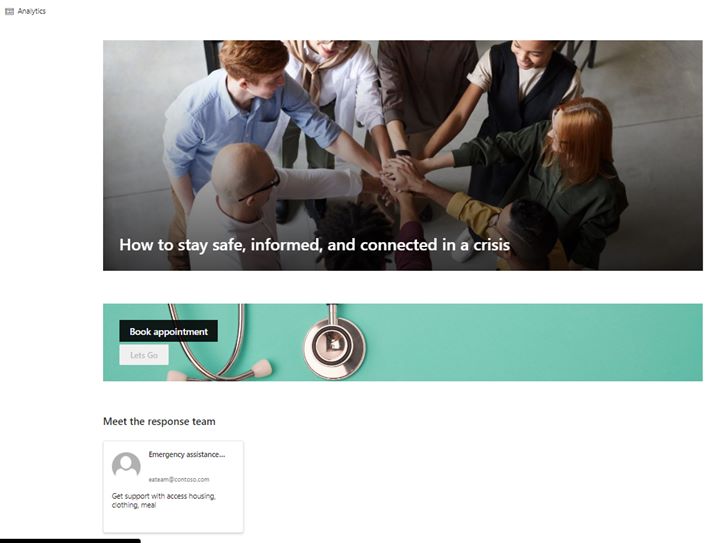The healthcare industry is evolving rapidly, adopting the latest technologies to provide consistent, high-quality medical services to patients. Medical centers are no longer stacked with piles of paper records; instead, digital transformation is digitizing all and sundry aspects of healthcare systems. All hospitals, clinics, and diagnostic centers are turning to digital products and services to enable efficient and secure medical record-keeping, facilitate real-time collaboration and communication, and improve productivity. Microsoft 365 is an excellent cloud-based set of collaborative tools that helps healthcare organizations achieve all this and much more.
But before we discuss how Microsoft 365 and SharePoint improve service delivery for medical systems, let’s first understand the goals of a healthcare organization.
The Goals of a Healthcare Organization
Here is a snapshot of what most medical organizations aim to achieve.
- Enhancing patient care standards by implementing best practices and evidence-based guidelines.
- Minimizing healthcare risks and liabilities by adhering to established protocols and safety procedures.
- Ensuring legal compliance with all applicable regulations and guidelines.
- Facilitating effective communication and collaboration among healthcare providers, staff, and departments to promote optimal patient outcomes.
- Efficiently managing critical healthcare documents, including medical records and sensitive patient information, with rigorous attention to security and confidentiality.
- Leveraging technology to automate healthcare workflows, from appointment scheduling to payment processing, to improve efficiency and accuracy.
- Disseminating vital information, policies, and guidelines through various channels to support ongoing education and training for healthcare providers and staff.
- Nurturing employee engagement and satisfaction by fostering a positive work environment that values teamwork, professional development, and work-life balance.
- Encouraging collaboration and partnership with other healthcare organizations to promote best-in-class patient care and outcomes.
- Developing business and financial acumen to ensure the sustainability and growth of the healthcare organization while maintaining the highest standards of patient care.
Microsoft 365 – An All-In-One Healthcare Solution
Microsoft 365 offers many features and capabilities to healthcare organizations to enable efficient administration, streamline workflows, and facilitate regulatory compliance. It also encourages collaboration between surgeons, doctors, nurses, and diagnosticians.
Moreover, Microsoft offers an exclusively healthcare-related product, Microsoft Cloud for Healthcare, which offers components from Azure, Dynamics 365, and Microsoft 365.
Let’s now discuss how technology helps healthcare organizations achieve the goals we mentioned earlier.
-
Collaboration and Communication
Microsoft Teams, offered as part of Microsoft 365, is an excellent tool for fostering a collaborative work culture in any organization. Doctors and nurses can use Teams to communicate and collaborate with each other in real-time, thus improving their efficiency manifold.
It allows you to share confidential patient data securely and store it in the cloud using OneDrive, a file hosting service by Microsoft.
Similarly, MS Teams enables you to conduct virtual meetings and appointments. Given the lockdowns imposed in the wake of the COVID-19 pandemic, such capabilities are now vital to the healthcare industry.
You can arrange virtual appointments between doctors and patients so that they can discuss medical matters without having to traverse long physical distances. Such meetings also facilitate dialogue and discussion between healthcare practitioners.

You can combine Microsoft Bookings with Microsoft Teams to enable remote patient care or telehealth. By leveraging the capabilities of these two tools, healthcare providers can easily schedule appointments with patients, manage their availability, and meet securely online.
To access Microsoft Bookings, users can either visit the booking staff office comm website or create a Teams application that integrates with the service. This integration allows healthcare providers to access the booking site directly within Teams and seamlessly schedule and conduct online appointments with their patients.

Here’s a list of telemedicine features offered by Microsoft 365 and MS Teams:
- Electronic Healthcare Record (EHR) integration
- Virtual visits
- Secure communication
- Templates
- Policy Packages
- Care collaboration and coordination
-
Regulatory Compliance
Microsoft 365 and Sharepoint Services help you adhere to governmental regulations like HIPAA. It uses Microsoft 365 Compliance Center to streamline and simplify the compliance procedure.
You can use it to securely store sensitive patient data and delete it once the stipulated period expires. As a result, your organization will be protected from violating key healthcare industry regulations.
-
Easily Engage with Patients
Microsoft 365 can truly enhance the medical care experience. Use these tools to automate appointment scheduling and offer virtual visits to your patients.
-
Protect Sensitive Data
Microsoft 365 helps you determine who can access your enterprise data. It also secures your patient data. You can use features like security groups, custom permissions, and policies that outline rules like when a user needs to change their passwords after a given period of time.

-
Thwart Cyberattacks
Cybercriminals are always on the prowl, looking for the weakest link in your cybersecurity framework. Small and medium businesses are often vulnerable to such attacks due to their lack of cybersecurity measures. Use Microsoft Defender for Office 365 to secure patients’ personal data, medical information, and business data.
Wrap Up
The healthcare industry, like every other industry, needs to adopt digital products and services that help it become more efficient, productive, and secure. Lifescience organizations and healthcare businesses are also turning to emerging technologies like AI and machine learning to achieve their business goals. Microsoft 365 is one such fantastic tool that can help you provide better medical care to your patients and an efficient environment for your caregivers.
Xavor is a proud Microsoft Gold Partner. We are committed to delivering innovative healthcare solutions to our clients worldwide. Contact us at [email protected] to learn how we can help you.

